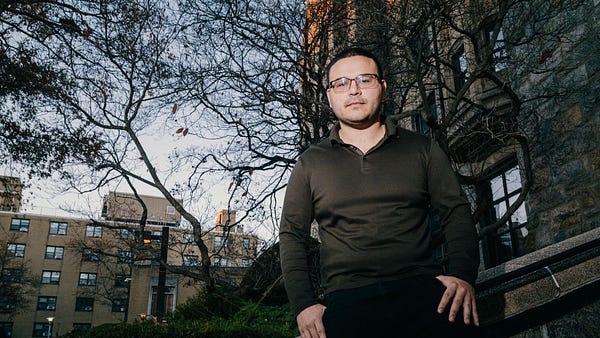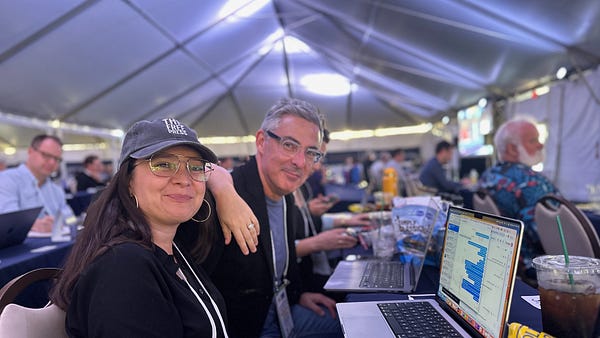
The Free Press

A lot of ink has been spilled over “book bans” in the last few years. The media have reported breathlessly about censorship sweeping the nation, claiming that books about race, gender, and sexuality are being pulled from school library shelves in Republican-run states.
But is that really what’s going on? In a new investigation for The Free Press, James Fishback finds the truth is a lot more complicated.
To get to the bottom of things, James (you’ll remember his name from this huge piece about the hijacking of high school debate) surveyed the library catalogs in 35 of America’s biggest public school districts, representing over 4,600 individual schools. What he discovered wasn’t so much a problem of banned books. It’s that kids are often exposed to only one side of the story.
For example: take how easy it is for kids to access memoirs by prominent Democrats like Barack and Michelle Obama, compared to memoirs by leading Republicans. More than half of the 35 districts James surveyed carried both of the Obamas’ books. But how many districts carried books by Nikki Haley, Tim Scott, Ron DeSantis, Vivek Ramaswamy, and Mike Pompeo?
The answer is zero.
That includes school districts in red states like Texas and Florida.
James lays out even more surprising data and comes to a conclusion: “Should libraries carry books that peddle progressive ideas? Absolutely,” he writes. “But only if they carry books that advocate for conservative ones too, so our young minds can benefit from the full spectrum of opinions. At a time of profound national division, the skill of appreciating and understanding the other side, even if you vehemently disagree, is more important than ever.”
Read his full investigation here:
Stumbling toward the White House
→ A hawkeye shrug: Just 15 percent of registered Republicans caucused in Iowa on Monday, a big drop from the 2016 turnout, when 29 percent of registered Republicans showed up. The weather—it was the coldest caucus on record—was undoubtedly a big factor, but surely the lack of drama is part of the story too: Why brave icy roads and arctic temperatures when the result (Trump) is a foregone conclusion?
→ Shock endorsement! Vivek Ramaswamy dropped out of the presidential race late Monday night, after he placed fourth in Iowa. But he was back in New Hampshire the next morning, only this time to campaign at a rally for Donald Trump, who he endorsed as the only other “America First” candidate in the race. His decision to back the former president shocked no one: Ramaswamy served as a Trump surrogate in the TV debates and, in the final stretch of campaigning in Iowa, posed with a group of supporters in t-shirts that read “SAVE TRUMP. VOTE VIVEK.”
Beyond annoying the heck out of his opponents, what did Ramaswamy achieve with his presidential run? The answer, I think, is a lot more than most people expected when he announced his candidacy last February. He entered the race a total unknown, and he leaves it not just as another rich dude who tried his hand at politics, but a major voice on the American right. And for us observers, Vivek 2024 offered a fascinating peek at millennial populism: very online, quick-witted, unbothered by the verities of the old GOP, and happy to throw the old campaign rulebook out the window. But for Vivek 2.0, the question is: How to grab our attention without being so. . . annoying?
ICYMI: Listen to Vivek Ramaswamy on Honestly.
→ Will New Hampshire deliver any more drama?: After Trump’s thumping win in Iowa, it’s now up to New Hampshire voters to decide if this primary will be a real race or a simple coronation. Right now all signs point to the latter. The latest poll of the New Hampshire Republican primary, from The Boston Globe and Suffolk University, has Trump with 50 percent, Haley at 34 percent, and DeSantis at 5.8 percent. Haley is doing much better there than Iowa, but remember: New Hampshire’s open primary and independent streak mean that anything short of a victory for Haley in New Hampshire will all but extinguish her chances of stopping Trump from winning the nomination.
→ Stefanik for veep?: Trump is debating vice-presidential picks the old-fashioned way—with donors and hangers-on during candlelit dinners at his country club. An update from the Court of the Donald, via NBC, who reported that when one guest suggested New York congresswoman Elise Stefanik, Trump nodded his head and said “she’s a killer.” (Stefanik’s most recent victim was Harvard president Claudine Gay, who she recently grilled with some really tough questions like genocide: for or against?)
Free Press Fight Club: The Battle of the Kelces
This week, Super Bowl-winning surefire future Hall of Famer and Philadelphia Eagles center Jason Kelce announced his retirement from the NFL.
Wait a second, sports? In The Free Press? I know, I know. But bear with me.
Jason Kelce is the older brother of Travis Kelce, who—in case you’ve been living under a rock—is dating Taylor Swift. The two also host a podcast together. And so, as his younger brother has shot to new heights of international stardom, Jason Kelce has become a foil on their weekly show: the scruffy dad of three sparring with the pop star’s boyfriend who dresses in designer clothes.
Jason Kelce’s retirement got us talking about a vitally important question: Who is the better Kelce brother? A pointless fraternal rivalry between two jocks from Ohio or a question that goes to the heart of what it means to be a man in 2024? You can be the judge of that, because it’s time for another Free Press Fight Club. Which way, midwestern man? Making the case for Jason Kelce is Evan Gardner. In Travis’s corner, right next to Taylor Swift, we have Suzy Weiss.
Ding ding!
Over to you, Evan:
I’m sure you’ve all heard about the primped influencer prancing around the globe with the world’s biggest pop star, but I’m here to tell you about Jason, his brother, the Working Man’s Kelce.
He’s two years older, graying around the edges ever so tastefully, with a bushier beard and, at nearly 300 pounds, has the kind of heft Travis could only hope for. He’s spent 13 years playing center—the NFL’s workhorse position—for the Philadelphia Eagles, during which he accrued all of the accolades (he’s only the fifth center ever to have at least six All-Pro selections) without any of the fuss and pomp that surrounds the other Kelce.
Jason doesn’t just look the part; he gets results. While Travis’s Kansas City Chiefs were responsible for the most dropped passes in the league (which I’m sure his self-promoting managers will tell you is totally unrelated to all those nights spent jetting around South America), Jason is the centerpiece of the best offensive line in the league.
Don’t get me wrong—I’m sure Travis’s lavish lifestyle is a blast—but big brother Jason knows that real work isn’t about pleasure. This season, he was the core of the Tush Push, the Eagles’ signature maneuver in which he and his teammates shoved themselves headfirst into quarterback Jalen Hurts’s behind to force him into the end zone. With each push, Jason could be heard roaring “Fuck my life” as he got the job done.
Further evidence that Jason is a no-nonsense, salt-of-the-earth guy: yesterday morning, he showed up at a McDonald’s drive-thru with a signed jersey for his favorite employee.
Jason even has a better love story than Travis: he met his wife, Kylie, the old-fashioned way, not through a friendship bracelet proposition or a backdoor celebrity setup, but on Tinder, like the rest of us. From there, the couple’s dreamy romance was off to the races. On their first date, Jason fell asleep on the bar table within 45 minutes, something any hardworking American can relate to.
So sorry, Swifties: in romance and in football, Jason has Travis beat.
Okay, Suzy, what about Travis?
Did I cringe, when, at the commercial break for the Golden Globes, Travis Kelce’s mug appeared in an advertisement for the Pfizer vaccine? I did. Was the family Campbell’s soup commercial, to put it generously, grating? Yes. The Saturday Night Live hosting turn, the clothing line, the podcast. It’s a bit much. And the tight end just signed with the talent agency CAA so that he can start acting. God help us.
But Travis Kelce is the better Kelce brother not because he’s subtle, but because he’s loyal.
He’s loyal to his mom, his big brother—he’s said of Jason, “Without that guy, I don’t know where [or] what I would be doing”—and, of course, to his megastar girlfriend, Taylor Swift.
“Seeing how smart Taylor is has been fucking mind-blowing,” he said of the singer. She has an “aura.” He thinks she is “hilarious.” He’s doe-eyed, sure, but he also respects her, and he has a good sense of humor about it all (unlike, it seems, Taylor herself). These are all important boyfriend qualities to model for the legion of young men, and women, who now look to him as a role model and prince of pop culture.
Kelce is Gen Z’s Marty Ginsburg: doting, proud, unthreatened. He’s a male Meghan Markle, except he seems serious about keeping his crown.
Letter to the editor
On Sunday, we received a message from Merav Svirsky, an Israeli whose brother Itai was kidnapped by Hamas and taken to Gaza. A day later, Hamas announced—in an appalling stunt designed to torment the hostages’ families—that Itai had died. We wanted to share Merav’s letter, sent to us when she did not know whether her brother was alive or dead, because it’s a heartbreaking window into what she—like thousands of Israelis—have had to cope with since October 7.
My name is Merav Svirsky. I’m an Israeli yoga teacher and artist. I was born and raised in Kibbutz Be’eri. On October 7 my life changed forever. Both of my parents, Orit and Rafi, were brutally murdered by the Hamas terrorists. My brother Itai (38) was kidnapped from my mother’s home, and he’s been held hostage in Gaza ever since. My two other brothers survived the attack, and so did my 97-year-old grandmother. Her Philippine caregiver, Grace, was murdered trying to protect her. My husband is also from Be’eri, and most of his family survived. His beloved aunt, who was a neighbor of my mother, was murdered too. Both of our families, those who survived, are now refugees in our own country. Our home was destroyed, our lives shattered.
It’s inconceivable that Itai is still in Gaza. One hundred days. Writing this number makes me shiver. In the past three months, the people of Israel have been demonstrating an amazing spirit of volunteering—contributing to the war effort, supporting the refugees, helping each other. But now, people are gradually getting back to their “normal life.” My greatest fear is this return to “normal life”—for our family, and for the families of the other 135 hostages, life has frozen and will not resume until our beloved ones return home alive. We’re not post-traumatic, because we’re in the middle of an ongoing trauma. We’re under a continuous terror attack, every minute of every day.
October 7 has taught me that I cannot trust anyone and anything. I lost trust in my country, in my government, in my army. The only way to restore (some of) the lost trust is to bring them home now.
In the past three months, the Israeli leadership has been talking about achieving victory against Hamas. There’s no such thing. We lost this war. My family lost this war on October 7. But although we cannot win the war, we can feel hope again. Hope should be the goal, not victory. And that hope can only be achieved by returning the hostages home. Now.
I have two sons, Eilam (7) and Keinan (4.5). They know so many people who are dead. Dozens. A few weeks ago they had a discussion between them about Itai, their beloved uncle. Eilam was arguing that he was not going to come back “because everyone else who had disappeared ended up being dead.” For the future of my children—for their ability to hope—Itai must return home. Nothing is more important than that, for the future of my children, for the future of my family, and for the future of my country.
For more of our coverage of the Israel-Hamas war, click here.
This week on Honestly: Why we still need to talk about the pandemic
It’s been nearly four years since Covid shut down the country. And after interminable pandemic debates, I get it; you probably never want to hear the word coronavirus again. But on Honestly this week, Joe Nocera urges us not to move on from the pandemic just yet.
As well as being a regular Free Press contributor, Joe is the co-author, with Bethany McLean, of a new book on America’s pandemic response, The Big Fail: What the Pandemic Revealed About Who America Protects and Who It Leaves Behind.
The problem, he argues, is that we’ve learned so little from our many pandemic mistakes. And unless we learn those lessons, we’re doomed to repeat them next time around.
Listen to Joe’s conversation with guest host Michael Moynihan here:
Oliver Wiseman is a writer and editor at The Free Press. Follow him on X @ollywiseman.
Become a Free Press subscriber today:




















Thank you for doing this research💗
Thank you for the reassurance. I understand supply and demand, even when it comes to which books a library acquires.
As for the Trans “literature,” your explanation helps, a bit, but not entirely because if the Trans stuff is merely a fad, it has a very long shelf life (pardon the pun), having emerged more than a decade ago and seeming to be escalating, not waning. I know that many (liberal) school districts have been pushing for books in their libraries and classrooms celebrating Trans identity, and getting fierce pushback from concerned parents.
I also know that some cultural “fads” last a very long time. Do you know that CRT was launched into higher ed some 40 years ago, beginning its long, gradual seepage downward through the grades? Now elementary school kids are being ordered to report their pronouns, and CRT literature is in school libraries, while some public libraries promote Drag Queen Story Hours. If those woke, leftist books just sit on the shelves, not being circulated, while Eric Carle and Dr. Seuss are still often read, why shelve the garbage books at all? Librarians must have a great deal of discretion about which books get shelf space, which is obviously limited. Is there a fear of being protested, attacked and “cancelled” if certain books were chucked? (Sometimes it seems better to keep your head down and be quiet, hoping to avoid confrontation and chaos; I understand and respect that instinct.)
You are your librarian wife are fortunate to be associated with a professional school where you say the curriculum remains unobjectionably traditional, if somewhat boring. But that place still sounds like the exception, not the rule, given the extent to which university departments across the spectrum have been overtaken by leftist themes: DEI, CRT, BLM, allegedly systemic racism, manipulation of Covid data, rampant grade inflation. We’ve seen story after story describing aspects of that situation right here at the FP. And I am intimately familiar with the leftist infiltration of medical and law schools, and those professions across the board.
Anyway, I appreciate our discussion, and will continue using my library card regularly. Libraries obviously have an important place in our society; if they did not, people wouldn’t care what goes on there.